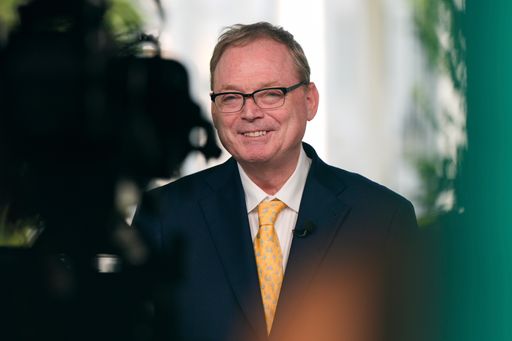President Donald Trump has indicated that his country's punishing tariffs on India will not come down amid Indian Prime Minister Narendra Modi's public shows of solidarity with Chinese and Russian leaders in the face of trade pressure from Washington.
Asked by a reporter on Tuesday if he is considering taking away some of the tariffs slapped on India, Trump said, "We get along with India very well, but India has for many years… it was a one-sided [trade] relationship only now since I came along and because of the power that we have with tariffs, India was charging us tremendous tariffs, they were about the highest in the world, number one."
Trump stated trade with India was limited due to tariff discrepancies, impacting domestic production as New Delhi's exports to America outweighed US exports.
"We therefore weren't doing much business with India, but they were doing business with us because we weren't charging them foolishly. We weren't charging them so they would send in massive, you know, everything they made they'd send it in, pour it into our country and therefore it wouldn't be made here, you know, which is a negative, but we would, not send in anything because they were charging us 100 percent tariffs," he told the reporters in White House.
He gave the example of Harley Davidson, saying the company couldn't sell into India because "There was a 200 percent tariff on a motorcycle."
"So what happens, Harley Davidson went to India and built a motorcycle plant. And now they don't have to pay tariffs. Same thing as us," he said.
The US President said that thousands of companies are coming into the US from China, Mexico and Canada "because they want to build here… the tariffs are protecting them and they want to avoid paying tariffs when they build their cars here."

Modi meets Xi and Putin in China
On Monday, Trump claimed that India has offered to reduce its tariffs on US goods to zero, a remark that came as Modi was in China for a summit of more than 20 leaders of non-Western countries of the Shanghai Cooperation Organisation, a China-backed initiative given renewed impetus by Trump's global tariff offensive.
In China, in an image designed to convey solidarity, Russian leader Vladimir Putin and Modi were shown holding hands as they walked jovially toward Chinese President Xi Jinping before the summit opened.
The three men stood shoulder-to-shoulder, laughing and surrounded by interpreters.
India has used the summit to mend ties with Beijing.
Modi, visiting China for the first time in seven years, and Xi agreed on Sunday their countries are development partners, not rivals, and discussed ways to improve trade.
Trump, who has accused New Delhi of bankrolling Russian war in Ukraine, has cancelled his highly anticipated trip to India later this year, amid fraying of ties between India and the US.
India has called the tariffs "unfair" and said it is continuing to engage in discussions with the US to address trade concerns. US is also seeking to enhanced access to India's agricultural and dairy markets. Despite multiple negotiation rounds for a trade accord, a deal remains elusive.
Modi has pledged to protect Indian farmers' interests, regardless of the cost.
"I am fully aware that I may have to pay a very heavy price personally, but I am prepared for it. For the farmers of my country, for the fishermen of my country, for the dairy farmers of my country, India stands ready today," Modi said last month.
Navarro says Indian Brahmins profiteering
Trump's advisers have described Russia’s war on Ukraine as "Modi’s war" and linked New Delhi's oil imports to sweeping new tariffs on Indian goods.
Last week, White House trade adviser Peter Navarro said: "Everybody in America loses because of what India is doing."
"The consumers and businesses lose, workers lose because India's high tariffs cost us jobs, factories and income. And then the taxpayers lose because we got to fund Modi's war."
When asked if he had meant "Putin's war," Navarro doubled down.
"I mean Modi's war, because the road to peace runs, in part, through New Delhi," he said.
In another interview, he said: "I want Indians to understand what is going on. Brahmins [elites] are profiteering by buying Russian oil at the expense of the Indian people".
In 2021, India imported negligibly from Russia, relying more on the Middle East. Currently, Russia accounts for over 40 percent of oil imports.

"This surge has not been driven by domestic oil consumption needs. Rather, what really drives this trade is profiteering by India's Big Oil lobby," Navarro wrote in a recent opinion piece.
"In effect, India acts as a global clearinghouse for Russian oil, converting embargoed crude into high-value exports while giving Moscow the dollars it needs."
US Treasury Secretary Scott Bessen has also accused India of profiteering from its sharply increased purchases of Russian oil during the war in Ukraine.
Bessent has argued that Russian oil now accounts for 42 percent of India's total oil purchases, up from under 1 percent before the war, and contrasted that with longtime buyer China, whose Russian oil purchases had increased to 16 percent from 13 percent.
"India is just profiteering. They are reselling," Bessent said. "What I would call Indian arbitrage - buying cheap Russian oil, reselling it as product has just sprung up during the war - which is unacceptable," he said.
"They’ve made $16 billion in excess profits — some of the richest families in India," Bessent said.



















